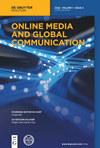Hashtags and heritage: the use of #italianamerican on Instagram
引用次数: 0
Abstract
Abstract Purpose Using both framing theory and Collier’s cultural identity theory, this paper seeks to study the use of #italianamerican on Instagram by first attempting to determine if it is used exclusively by Italian Americans as a way to demonstrate their own cultural identity. The paper will then examine whether the message valence of posts using #italianamerican demonstrates users’ personal perceptions of Italian American culture. Finally, the paper will examine if there is a relationship between #italianamerican posters’ ethnicity and the message valence of their posts. This paper does not argue that Italian Americans are the only Americans of European ancestry taking part in the hashtag phenomenon; rather, this paper is meant to examine how one ethnic group attempts to define itself by its use of digital and social media. Design/methodology This simple exploratory study examined the 50 most recent Instagram posts using #italianamerican as they appeared on November 1, 2022. The posts were sent to two independent coders who analyzed their visual content. Findings This study provides insight into how ethnicity and cultural familiarity are associated. Results show that message valence and ethnicity are not linked, as anyone can admire and respect a culture and post a positive message about it on social media, even if it is not their culture of origin. Members of a specific ethnic group tend to have a stronger familiarity with their culture of origin, as demonstrated by the posts selected for this study. Implications This study showed that Italian Americans use social media to educate others about their heritage, as well as to celebrate their culture of origin. Value The methods used in this study could be applied to other European American ethnic groups and their social media usage, including Irish Americans, Polish Americans, and German Americans, among others.标签与遗产:Instagram 上 #italianamerican 的使用
摘要目的运用框架理论和科利尔的文化认同理论,研究#italianamerican在Instagram上的使用,首先试图确定#italianamerican是否只被意大利裔美国人用作展示自己文化认同的一种方式。然后,本文将研究使用#italianamerican的帖子的信息价值是否表明了用户对意大利美国文化的个人看法。最后,本文将研究#意大利裔美国人海报的种族与他们帖子的信息价值之间是否存在关系。本文并不认为意大利裔美国人是唯一参与标签现象的欧洲裔美国人;相反,本文旨在研究一个民族如何试图通过使用数字和社交媒体来定义自己。设计/方法这项简单的探索性研究调查了2022年11月1日Instagram上出现的50条使用#italianamerican的最新帖子。这些帖子被发送给两位独立的编码员,他们分析了这些帖子的视觉内容。这项研究深入了解了种族和文化熟悉度之间的关系。结果显示,信息的价值和种族并没有联系,因为任何人都可以钦佩和尊重一种文化,并在社交媒体上发布积极的信息,即使这不是他们的文化起源。正如本研究选择的职位所证明的那样,特定种族群体的成员往往对其起源文化有更强的熟悉程度。这项研究表明,意大利裔美国人使用社交媒体来教育其他人他们的遗产,以及庆祝他们的起源文化。本研究中使用的方法可以应用于其他欧裔美国人群体及其社交媒体使用,包括爱尔兰裔美国人、波兰裔美国人、德裔美国人等。
本文章由计算机程序翻译,如有差异,请以英文原文为准。
求助全文
约1分钟内获得全文
求助全文
来源期刊

Online Media and Global Communication
Communication, Media Studies, Internet Studies, International Studies, International Relations-
自引率
0.00%
发文量
0
期刊介绍:
Online Media and Global Communication (OMGC) is a new venue for high quality articles on theories and methods about the role of online media in global communication. This journal is sponsored by the Center for Global Public Opinion Research of China and School of Journalism and Communication, Shanghai International Studies University, China. It is published solely online in English. The journal aims to serve as an academic bridge in the research of online media and global communication between the dominating English-speaking world and the non-English speaking world that has remained mostly invisible due to language barriers. Through its structured abstracts for all research articles and uniform keyword system in the United Nations’ official six languages plus Japanese and German (Arabic, Chinese, English, French, Russian, Spanish, Japanese, and German), the journal provides a highly accessible platform to users worldwide. Its unique dual track single-blind and double-blind review system facilitates manuscript reviews with different levels of author identities. OMGC publishes review essays on the state-of-the-art in online media and global communication research in different countries and regions, original research papers on topics related online media and global communication and translated articles from non-English speaking Global South. It strives to be a leading platform for scientific exchange in online media and global communication.
For events and more, consider following us on Twitter at https://twitter.com/OMGCJOURNAL.
Topics
OMGC publishes high quality, innovative and original research on global communication especially in the use of global online media platforms such as Facebook, TikTok, YouTube, Twitter, Instagram, WhatsApp, Weibo, WeChat, Wikipedia, web sites, blogs, etc. This journal will address the contemporary concerns about the effects and operations of global digital media platforms on international relations, international public opinion, fake news and propaganda dissemination, diaspora communication, consumer behavior as well as the balance of voices in the world. Comparative research across countries are particularly welcome. Empirical research is preferred over conceptual papers.
Article Formats
In addition to the standard research article format, the Journal includes the following formats:
● One translation paper selected from Non-English Journals that with high quality as “Gems from the Global South” per issue
● One review essay on current state of research in online media and global communication in a country or region
 求助内容:
求助内容: 应助结果提醒方式:
应助结果提醒方式:


